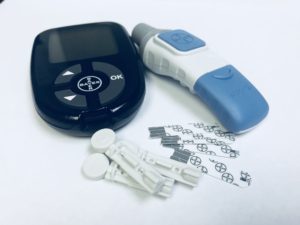Importance of Blood Sugar Regulation

Blood sugar regulation is vital to the proper functioning of all major body systems. Blood sugar plays an especially important role in digestive, adrenal, immune, thyroid and brain health. Chronic dysglycemia, or poor blood sugar regulation, could lead to obesity, hormone imbalances, adrenal fatigue, hypothyroidism, kidney disease, and much more. When it comes to dysglycemia, the two main areas of concern are hypoglycemia and insulin resistance.
Hypoglycemia is low blood sugar. This usually happens in response to an insulin surge from eating a meal high in sugar or carbs. These insulin surges and subsequent glucose drops are problematic if they happen repeatedly throughout the day causing blood sugar levels to constantly swing from high to low. If you skip meals or you are not eating enough protein and fat as fuel, only relying on sugary foods, you will notice repeated crashes in energy and cognitive functioning.
On the other hand, if you are constantly eating excessive amounts of sugar, the body has to constantly pump out insulin to process the glucose and get it into the cells. After an extended period of time, the body gets to a point where it just doesn’t take this message seriously anymore, starts to ignore the signal, and the cells become resistant to insulin. When glucose can’t get into the cells to provide energy, proper cellular functioning fails, symptoms begin and the excess sugar in the system gets stored as fat.
Let’s take a look at some of the symptoms of hypoglycemia and insulin resistance.
Symptoms of hypoglycemia:
- cravings for sweets
- becoming irritable or light headed when meals are missed
- dependency on caffeine for energy
- eating to relieve fatigue
- feeling shaky/jittery
- easily agitated or nervous
- poor memory
- blurred vision
Symptoms of insulin resistance:
- fatigue after meals
- constant hunger
- craving for sweets that is not relieved by eating them
- Always craving sweets after meals
- large waist girth, wider than hips
- frequent urination
- increased appetite and thirst
- difficulty losing weight
- migrating aches and pains
It is possible to have a combination of the two issues and having hypoglycemia could lead to insulin resistance.
How we eat and what we eat is so important and central to improving and maintaining good health. Unfortunately, the standard American diet is setting us up for failure. Americans have become much too addicted to sugar and much too reliant on fast food and processed/packaged foods. These foods are low in useful nutrients and very high in sugar, refined carbs, and harmful chemicals.
So where do you begin in getting your blood sugar under control? First figure out where you currently stand.
- Look at the symptoms above and decide if you are dealing with hypoglycemia, insulin resistance, or both.
- Buy a glucometer and check your blood sugar upon waking. Ideally, you want the number to be between 85-99 mg/dL. Write that number down and start tracking it every morning.
- Get blood work done to check your A1C. This measurement reflects a 3 month average of your blood sugar and will tell you if you are pre-diabetic or diabetic. Ideally, this number should be between 4 and 5.6%.
Once you’ve identified a problem, start making positive changes.
- Change your diet! This is a must. Don’t put the temporary pleasure of a sweet treat above a lifetime of good health. Reduce or cut out grains, sugar, packaged foods, fast food, soda, fruit and fruit juices. Eat more vegetables, meat, nuts, beans, and healthy fats like avocado, olives, and coconut oil.
- Intermittent fasting is a good idea for the insulin resistant group (not the hypoglycemic group). Intermittent fasting is when you only eat for 8-10 hours/day. For example, only eat from 12p-8p every day. If you get hungry late at night or in the morning, you can have a tablespoon of coconut oil. This lets the pancreas and digestive system rest and restore and reduces the insulin response.
- For those with hypoglycemia, make sure you eat regularly. Have small meals every few hours, especially protein upon waking and never eat sugar or carbs alone, always pair with protein and fat.
- Get at least 30 minutes of moderate aerobic activity daily, think walking, hiking, yoga, swimming. These activities will burn fat and lower blood sugar levels.
- Book an appointment with a holistic health care provider who can work with you on diet, interpreting blood work, and prescribing supplements and herbs.
- Get regular acupuncture treatments! Acupuncture has been shown in research to reduce A1C, regulate hormones like insulin, and help the body process glucose.
Completely changing the way you eat and breaking bad habits can be very difficult and kicking the sugar addiction can be as challenging as a drug addiction, but that highlights how important it is. You do not need any food or substance to have that kind of hold over your life and your health. You also don’t want to go down the road of diabetes and lifetime of medications and side effects, nerve damage, kidney failure, loss of eyesight, amputations. It’s not a pretty picture and is unfortunately the reality for too many Americans right now. Get help today to start making positive changes in your life. Contact Dr. Gaffney through the connect tab or make an appointment online.


